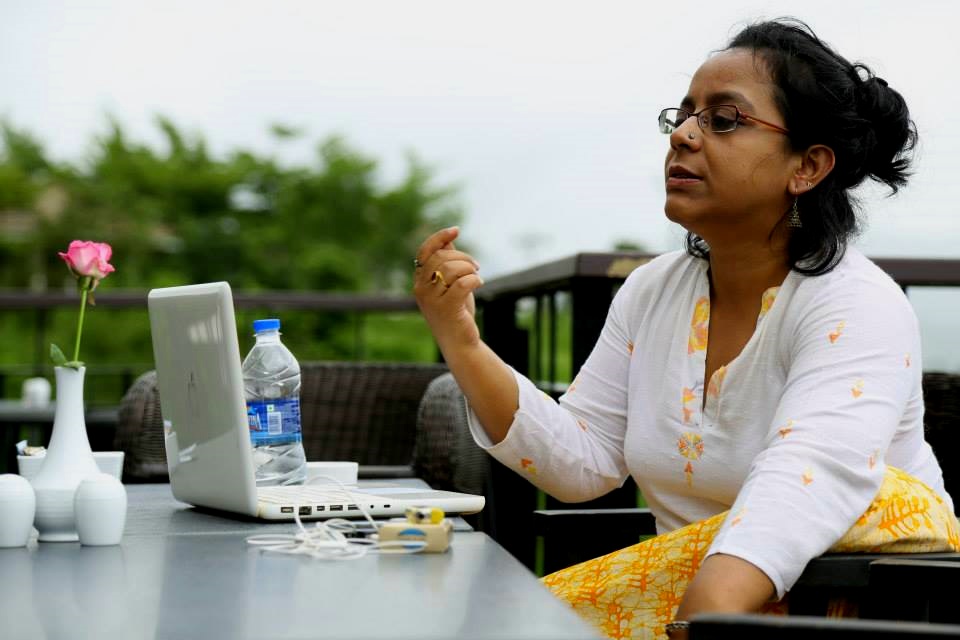
Bollywood gives no importance to writers, and the audience is all excited about the film actors, stars, songs from the film, the cinematic experience and even the director. But a writer, who is still considered the ‘First technical crew’ in cinemas, is the backbone of a film, who barely is given any credit. Pubali Chaudhuri, the winner of National Film Award for Best Hindi Film in 2008 for her first screenplay, Rock On! and Filmfare Award for Best Screenplay in 2014 for Kai Po Che talks to Kaberi Dutta Chatterjee, doubting if anyone will be excited about reading her story.
Within two years of graduating from the Film and Television Institute of India (FTII) Pubali Chaudhuri rocked the nation with her inimitable storyline and screenplay, Rock On! (2008), a year which was interspersed with popular films like Jodhaa Akbar and Singh Is King. Rock On went on to win seven Filmfare awards, four National awards and the cast was featured on the cover of the September 2008 issue of Rolling Stone (India). Its screenplay has also been added to the Academy Film Archive. Yet, Pubali is apprehensive of audience’s interest in storytellers. “Why interview me? Why would readers be interested in the storyteller?” was her first question when I approached her for an interview.
Q: Your career hit off right after your graduation from FTII with ‘Rock On!’, a film that rocked the country with a musical in 2008. What was the inspiration for such a wonderful storyline?
Pubali: Yes, I suppose I was lucky to have a theatrically released film that got noticed amongst a certain section of the audience within two years of my graduating from FTII. The director, Abhishek Kapoor, had approached me with the basic idea of a college band reuniting. I had a deep and personal connect with the concept as I spent my college years closely associated with Calcutta based rock bands, primarily with a band called Cactus. I saw the resurgence of independent music during the mid to late 90’s. So the ‘Rock On’s terrain was familiar turf for me.
Q: Your next, ‘Kai Po Che’, for which you won the Filmfare Award, was based on Chetan Bhagat’s book, 3 Mistakes of My Life. What was the course of action you had in mind when you adapted a popular novel for a film?
Pubali: Kai Po Che was a huge learning curve. At first read, it seemed, that Chetan had all the elements of a popular narrative in his book – cricket, friendship, Hindu- Muslim bonding, romance. However adaptation is a different beast altogether! You have to discover the basic story, which, though inspired from the book, is independent by nature.
Kai Po Che had two crucial differences from the original novel – for one, the book is told from one character, Govind’s, point of view (thus the title). We changed that to make it an omniscient telling of three friends. We also had decided on an alternate climax (in the book the three friends are trying to save Ali, the Muslim boy, from the Hindu mob and in the ensuing scuffle Omi gets killed). In the film we complicated this friendship tale by putting one of our protagonist’s on the side of the attackers. This had repercussions in the entire plotting and characterisation of the story to leading up to this film climax. Omi’s journey ( played by Amit Sadh ) was entirely the invention of the film.
Q: ‘Rock On! 2’ hit a legal battle and now is set to be released in November, 2016. Has the screenplay rights been granted solely to you, or also to Abhisekh Kapoor? Do you want to clarify anything to your fans in Canada about how you feel about sharing the screenplay credit?
Pubali: I don’t believe that screenwriters have fans, to begin with! Film writers work deep in the background of the film — we are the first ‘technicians’ to start work on a film. Much before the audience knows about a film, its star cast, director, the music or what has now become a latest fad – the box office collection numbers.
In any case, yes we (Abhisekh and I) arrived at a settlement regarding the legal dispute around the sequel of Rock On. It was decided to accord Abhishek Kapoor a shared story credit along with me, while I retain a solo screenplay credit for the film.
Q: Rock On!, Kai Po Che, Rock On! 2. All of your screenplays have been great success in the box office. So much that, you are almost making viewers sit up and take notice of screenplay and storywriters, who, in reality, are the spinal cords of any film. Why do you think storywriters in Bollywood get so little attention?
Pubali: Well to be honest, none of my films would compete with the 100 crore (and counting) box-office club. What they certainly have is a certain memorability. And that makes the entire struggle, both creative and professional, worth the while for a writer.
As a creative professional you want people to remember your work, even if they don’t know how exactly you contributed to it. I doubt that any audience member remembers box office collection numbers… what they do remember is really the story, the performances, the entire cinematic experience. Yet, the working environs for screenwriters still remain a challenge in the industry – our Intellectual Property rights as writers are not recognised, we are yet to start a system whereby we can receive royalties, and perhaps what is the most hurtful, is that too often, screenwriters do not get the recognition and the respect that they deserve from the directors and producers.
It’s a complicated issue. Apart from plain business reasons, there is also this warped understanding of the ‘auteur’ theory of film making — the director as the ‘author’ of the film. Films are considered a director’s medium. However, while every other department, like Cinematography, Editing, Sound or Production Design is devoted to translate the ‘director’s vision’, a screenwriter creates part of that directorial vision as the blueprint maker. Unless the writer and director relationship is driven by genuine trust and respect, there will always be the pitfall of exploiting and overshadowing the writer’s contribution to feed the ‘me’ complex of directors!
Q: When you wake up every morning, do you get bitten by the bug of writing a new storyline, or reading a good book which can get you a good storyline?
Pubali: Are you crazy ?! I like quoting Thomas Mann on this and its one of the few things that makes me feel like a writer. Mann once said that the only thing differentiating writers from others is that writing is hard for writers! So instead of some brilliant flash of inspiration what I am battling with almost on a daily basis is the anxiety of writing — fighting procrastination, fighting self doubt and feelings of inadequacy. It’s very much a neurotic process for me… the only thing is that by now I am somewhat familiar with the contours of my neurosis. But yes, I enjoy reading and watching good films. And besides, those are some of the best excuses to get away from doing the real writing!
Q: Your success stories really do not fit into the ‘Bollywood bubble’ storylines, although of late the Hindi Film industry has been producing great original stories. What kind of a trend do you see in storylines that would hit the box-office button in Bollywood?
Pubali: I am far too much of a recluse and misfit in the film industry to comment on ‘trends’. My limited understanding tells me that studios and producers are all hell bent on larger than life movies — star cast, franchises, comic book heroes — whatever is the easiest way to the wallet of the ticket buying audience. As a writer and film maker, I am interested in something to touch my audience’s hearts and minds with.
Having said that, there have been films like Badlapur, Court, Fandry (these two being Marathi films though ) Dum Laga Ke Haisha, PIku, Masaan or a Titli that do not tread the oft-beaten path of formulaic story telling. Even then, the ones without a star cast in the above mentioned list might not meet trade pundits’ approval based on the revenue they earned. So it really all depends on our audience — where they spend their money, what they find entertaining, what kind of films really touch them, beyond the loud noise of the marketing machinery telling them what to watch.
Q: Can we get an insight into your thoughts of your next venture?
Pubali: At this stage of my career, I am really keen on getting to tell my original stories on the floor. I have just completed the first draft of a script, which is set in a college campus. Currently I am developing the screenplay of one of my original stories, which a director is interested in — but its too early in the day to call it a ‘venture’ really. As a writer, I have to follow Lord Krishna’s advice — I must keep on working (writing) without expectations of any results!
Q: Since we had seen an excellent round-up of characters in Rock On, and it closed up very well, leaving no loose strands, I am curious to know what is ‘Rock On!2’ all about? How did you think of opening up an almost closed storyline?
Pubali: That’s really for me to know and you to find out once the film is released! As such you are right in observing that we had neatly tied up all the strands in the original film. Undoubtedly it was one of my biggest challenges to re-start the story with the same characters – but those characters are like real life people for me given the amount of time I have spent with them in the solitude of my room, right from when I started writing Rock On in 2006 — to the 10 years it will complete by the time the sequel releases (Inshallah) ! And if they are living in my head, perhaps they will come alive on the screen as well?
(Kaberi D. Chatterjee is a novelist/ journalist and author of Neil Must Die and several other books, and is Editor of The South Asian News. She can be reached at kaberisans@gmail.com)


 South Asian News E-Paper
South Asian News E-Paper Punjabi News E-Paper
Punjabi News E-Paper

















